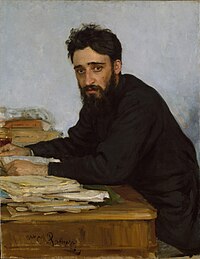Vsevolod Garshin

Vsevolod Mikhailovich Garshin (Все́волод Миха́йлович Гаршин) (14 Feb 1855–05 April1888) was a Russian author of short stories.
Life
Garshin's father was an army officer, who committed suicide in his presence, when Vsevolod was seven. During the Russo-Turkish War, Garshin, a pacifist, was drafted and served as a private in the infantry. He was well liked in his unit, by fellow soldiers and officers alike, and was wounded during a battle in Bulgaria.
His experiences as a soldier provide the basis for his first stories, including the very first, "Four Days" (Russian: "Четыре дня"), a powerful work based on a real incident. The narrative is constructed as the interior monologue of a wounded soldier left for dead at the battlefield for four days, face to face with the corpse of a Turkish soldier he had killed. Garshin's intense empathy for all beings is already evident in this first story.
Despite early literary success, he was periodically plagued by bouts of mental illness. At the age of 33, Garshin committed suicide by jumping from the fifth floor of his apartment building.
Work

Garshin's work is not voluminous: it consists of some twenty stories, all of them contained in a single volume. His stories are permeated with the spirit of compassion and pity that some have compared to Dostoevsky's.[citation needed] In A Very Short Novel he examines the infidelity of the woman to the crippled hero. The story displays Garshin's talent for concentration and lyrical irony. That Which Was Not and Attalea Princeps are fables with animals and plants in human situations. The second of these stories is saturated with a spirit of tragic irony. In Officer and Servant he is a forerunner of Chekhov; it is an excellently constructed story conveying an atmosphere of drab gloom and meaningless boredom.
His best-known and most characteristic story is The Red Flower, the first in a long row of lunatic-asylum stories in Russian literature (the next in time was Chekhov's Ward No. 6). In it Garshin's morbid and high-strung moral sensitiveness reaches its highest pitch. It is the history of a madman who is obsessed by the desire to challenge and defeat the evil of the world. He discovers that all evil is contained in three poppies growing in the middle of the hospital garden, and with infinite astuteness and cunning he succeeds in defeating the vigilance of his warders and picking the flowers. He dies from nervous exhaustion, but dies happy and certain of having attained his end. The oppressive atmosphere of the asylum is conveyed with effective skill. The end comes as a relief, like death to a martyr, but there is in it also a pang of bitter irony.
References
![]() This article incorporates text from D.S. Mirsky's "A History of Russian Literature" (1926-27), a publication now in the public domain.
This article incorporates text from D.S. Mirsky's "A History of Russian Literature" (1926-27), a publication now in the public domain.
